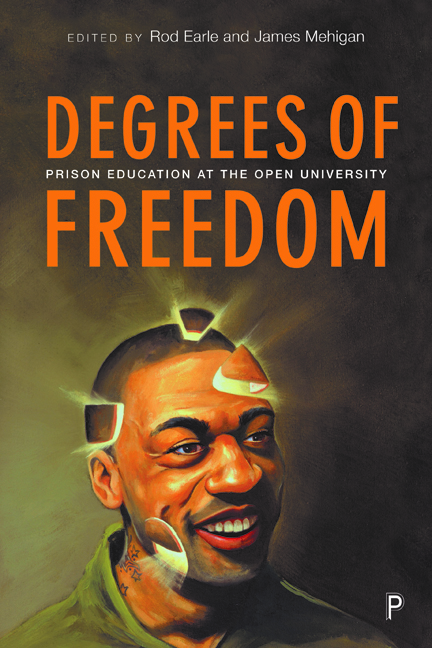Book contents
- Frontmatter
- Dedication
- Contents
- Notes on Contributors
- Acknowledgements
- 1 Openings and Introductions: Education for the Many, Prison for the Few
- 2 From Prisoner to Student
- Vignette 1 Choosing My Journey
- 3 Pioneers and Politics: Open University Journeys in Long Kesh During the Years of Conflict 1972–75
- Vignette 2 Avoiding the Mind-Numbing Vortex of Drivel …
- 4 A University Without Walls
- Vignette 3 Starting a New Chapter
- 5 Open Universities, Close Prisons: Critical Arguments for the Future
- Vignette 4 Out of the Abysmal
- 6 The Light to Fight the Shadows: On Education as Liberation
- 7 From Despair to Hope
- Vignette 5 Making my Commitment
- 8 Straight Up! From HMP to PhD
- 9 From Open University in Prison to Convict Criminology Upon Release: Mind the Gap
- Vignette 6 Message to a Prisoner
- 10 From the School of Hard Knocks to the University of Hard Locks
- 11 Becoming me with The Open University
- Vignette 7 Catching up with Kafka
- 12 From D102 to Paulo Freire: An Irish Journey
- Vignette 8 My Journey, My New Life
- 13 Ex-Prisoners and the Transformative Power of Higher Education
- Vignette 9 Prison Choices: Taking a Degree or Packing Tea?
- 14 What the OU did for me
- Appendix Study with The Open University
- Index
4 - A University Without Walls
Published online by Cambridge University Press: 11 March 2021
- Frontmatter
- Dedication
- Contents
- Notes on Contributors
- Acknowledgements
- 1 Openings and Introductions: Education for the Many, Prison for the Few
- 2 From Prisoner to Student
- Vignette 1 Choosing My Journey
- 3 Pioneers and Politics: Open University Journeys in Long Kesh During the Years of Conflict 1972–75
- Vignette 2 Avoiding the Mind-Numbing Vortex of Drivel …
- 4 A University Without Walls
- Vignette 3 Starting a New Chapter
- 5 Open Universities, Close Prisons: Critical Arguments for the Future
- Vignette 4 Out of the Abysmal
- 6 The Light to Fight the Shadows: On Education as Liberation
- 7 From Despair to Hope
- Vignette 5 Making my Commitment
- 8 Straight Up! From HMP to PhD
- 9 From Open University in Prison to Convict Criminology Upon Release: Mind the Gap
- Vignette 6 Message to a Prisoner
- 10 From the School of Hard Knocks to the University of Hard Locks
- 11 Becoming me with The Open University
- Vignette 7 Catching up with Kafka
- 12 From D102 to Paulo Freire: An Irish Journey
- Vignette 8 My Journey, My New Life
- 13 Ex-Prisoners and the Transformative Power of Higher Education
- Vignette 9 Prison Choices: Taking a Degree or Packing Tea?
- 14 What the OU did for me
- Appendix Study with The Open University
- Index
Summary
The Open University has, in a real sense, two ancestries. One is technological. The other is ideological – the notion of a people's university for continuing education throughout life, the notion of deschooling and universities without walls.
(Hooper, 1974, p 183)During its formative years the development of prisoner education at The Open University (henceforth OU) was shaped by prisoners, prison and OU staff, and framed by a government desire to maintain and develop society through broadening prospects for social improvement. OU staff tended to see the university as part of a social democratic commitment to rehabilitation. Their pedagogy encouraged learners to be active in constructing knowledge by reflection on experience. For many prisoners, education was a means of escape, or at least engaging with ideas from beyond the walls.
The first part of this chapter outlines the OU's creation as an element of the support for pluralism, wider opportunities and the belief that humans can and should shape the world which defined the post-war settlement. Directed by overt government audit and intervention, the OU employed industrial-scale teaching and a range of media to showcase scientific efficiency and to promote Britishfocused culture and western values. Within the context of a Cold War rivalry which stimulated further expansion of welfare provision, the OU normalized the marketisation of social democracy. This understanding of the OU's role informs the focus in Chapters 6 to 14 on the perspectives and understandings of some of those involved in the OU's prison work.
The OU had its roots in part-time education for adults, developed from the 18th century, in the correspondence courses and university extension initiatives of the 19th century, and in the 20th-century sandwich courses, summer schools and educational radio and television broadcasts. These seeds were nurtured in the 1960s when the post-war population bulge led to an increased demand for higher education, greater interest in post-compulsory education and widespread acceptance that expenditure on education was reasonable and likely to aid sound governance.
- Type
- Chapter
- Information
- Degrees of FreedomPrison Education at The Open University, pp. 51 - 70Publisher: Bristol University PressPrint publication year: 2019



